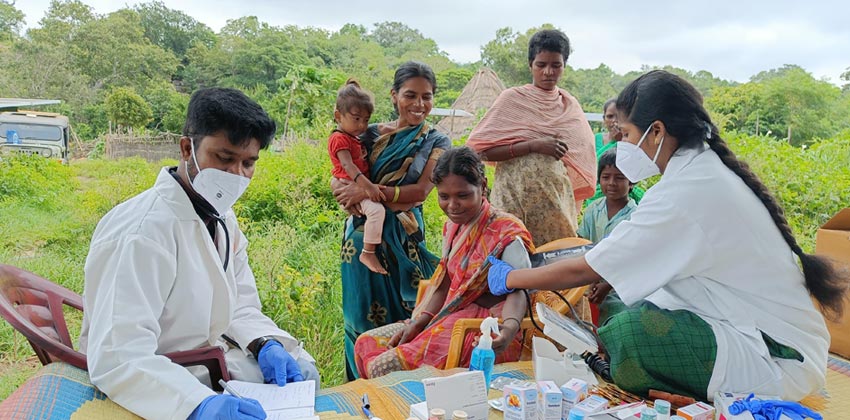Under the big banyan tree at a penta in Amrabad, Telangana, Dr M Rajashekhar from Apollo Foundation Total Health sets up a health camp. Word of the camp spreads through the village and soon enough, about 15 women have gathered with their children in tow. An 18-year-old complains of nausea and vomiting, and Dr Rajashekhar asks for the date of her last period. She doesn’t remember. Upon some insistence: “Maybe three months ago?” she ventures a guess.
Teenage pregnancies are a common occurrence in the Chenchu tribes of Amrabad and NSTR. “Often, they may not remember their last menstrual date, so it is difficult to say how far along they are,” says Dr Rajashekhar, who joined the Total Health team in Amrabad earlier this year.
Maternal and infant health is one of the top concerns when it comes to Chenchu women’s health, according to the Total Health team that has been working in the Amrabad forest since 2020. Given that many of the Chenchu settlements are located as far as 50 km inside the forest, healthcare during pregnancies is not easily accessible for women.
In Amrabad, a team from the village PHC visits the villages inside the forest once a month. While the Total Health team holds health camps in each penta twice a month, other NGOs, like Rural Development Trust (RDT), also do periodic healthcare checkups.
Dr Saifulla Khan, who has been the medical officer at RDT Mannanur for the past 7 years notes, “The issue of maternal health is compounded given that women get married at ages as young as 15 years, and give birth without much gap between deliveries, which increases the chances of a prolapsed uterus.”
Infant health as a factor of maternal health
A group of women gathered at a school in Yerragondapalem, NSTR, describe how just 6 months ago, they lost one of their friends, G Lakshmi. “She had just delivered a baby at home, and it was not an easy delivery, but she believed she would recover on her own. However, her condition kept worsening and 20 days later, even though she finally did go to the hospital, she did not make it.” This was Lakshmi’s third child; her first was born 6 years ago when she was 19.
There is an overall reluctance in the community to visit the nearest government hospital, about 10 km away. “We generally walk for the first 2 km and then get an auto, which takes a minimum of Rs 500. If it is urgent and we need to call an auto inside our penta, we will have to pay up to Rs 1,000,” says Sailamma, a 20-year-old resident of the penta. It is a significant amount given that most of the women do not have fixed incomes, making around Rs 6,000 per month through daily wage jobs.
Inaccessibility to healthcare has an even greater effect on the newborn infants. In Pothuraju penta alone, two children under 5 died last year. B Malleshwari who lost her daughter to a fever says, “Our newborns are not in the best of health… Sometimes we have to go up to Kurnool for treatment.”
Adds B Venkatamma, “Children definitely need better healthcare here, and we can’t always afford to go to hospitals.” The 20-year-old lost her 18-month-old firstborn last year.
The reluctance to go to a hospital also stems from feeling discomfort with mainstream society, according to Dr Saifulla. “Even if they go to the hospital for a checkup, they would not like to be admitted or stay there long enough to take care of the baby. They might be discriminated against, and so, have difficulty adjusting and would rather be independent,” he says.
Role of hygiene and nutrition
But the main causes of poor health among women and infants are two-fold: nutrition and hygiene.
The Total Health team has found anaemia to be common among Chenchu women. A 2015 study of the diet and nutrition profile of the Chenchu population across 42 pentas in both Telangana and Andhra Pradesh revealed that the diet was significantly lacking in micronutrients such as vitamin A, iron, riboflavin, and folic acid.
The study also found that the prevalence of underweight and stunting among children under 5 years of age was 42% and 53% respectively. Six-month-old infants are also fed a diet of chilli and onions chutneys: “It is believed that it drives away a cough,” says K Ankamma, a 45-year-old woman from Yerragondapalem.

“The lack of personal hygiene results in skin and genital infections among women here. Children too show a lot of skin infections like scabies,” says Dr Saifulla.
It is for this reason that 15-year-old Kollamma had to drop out of school after class 10. “I would have severe period cramps and my body would swell up during that time, sometimes lasting for the better part of the month. I eventually went to the government hospital and the doctor there said it could be because the cloth I use may not be hygienic.” As their houses lack toilets, Kollamma has to wait until after dark to bathe, making hygiene maintenance a bigger issue.
At just 15, Kollamma makes her own living gathering and selling forest produce. Her parents are already looking for a suitable match for her, to get her married. The cycle of an unhealthy life could very well be beginning for Kolamma. However, she seems adamant to break out of it. “I told my parents I will not marry until I am 20 at least,” she says.

